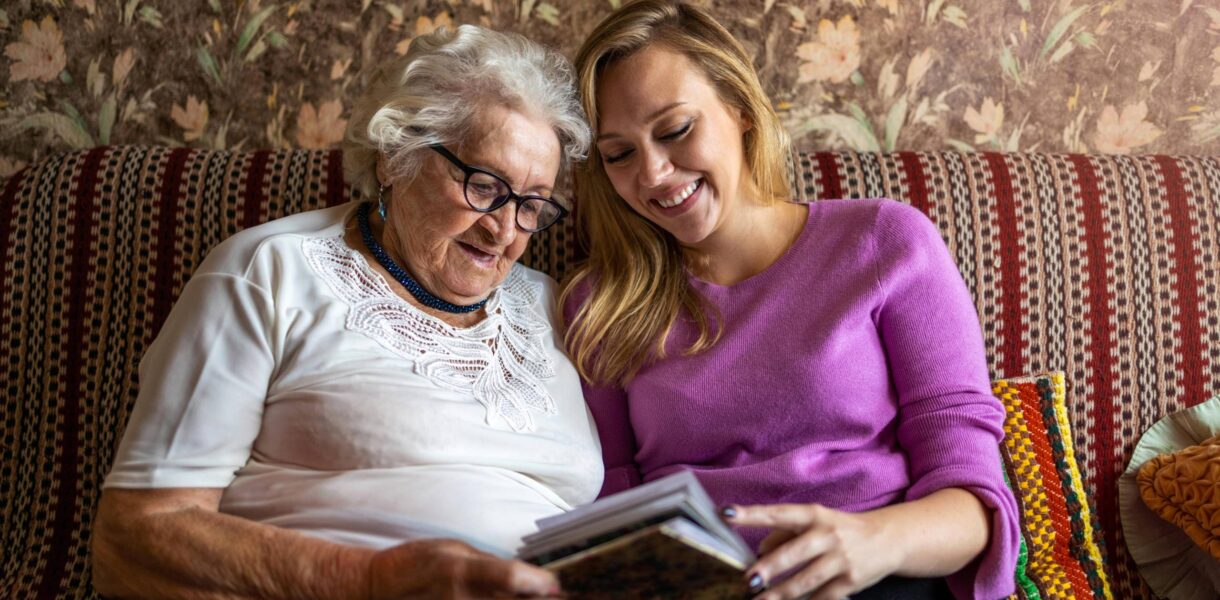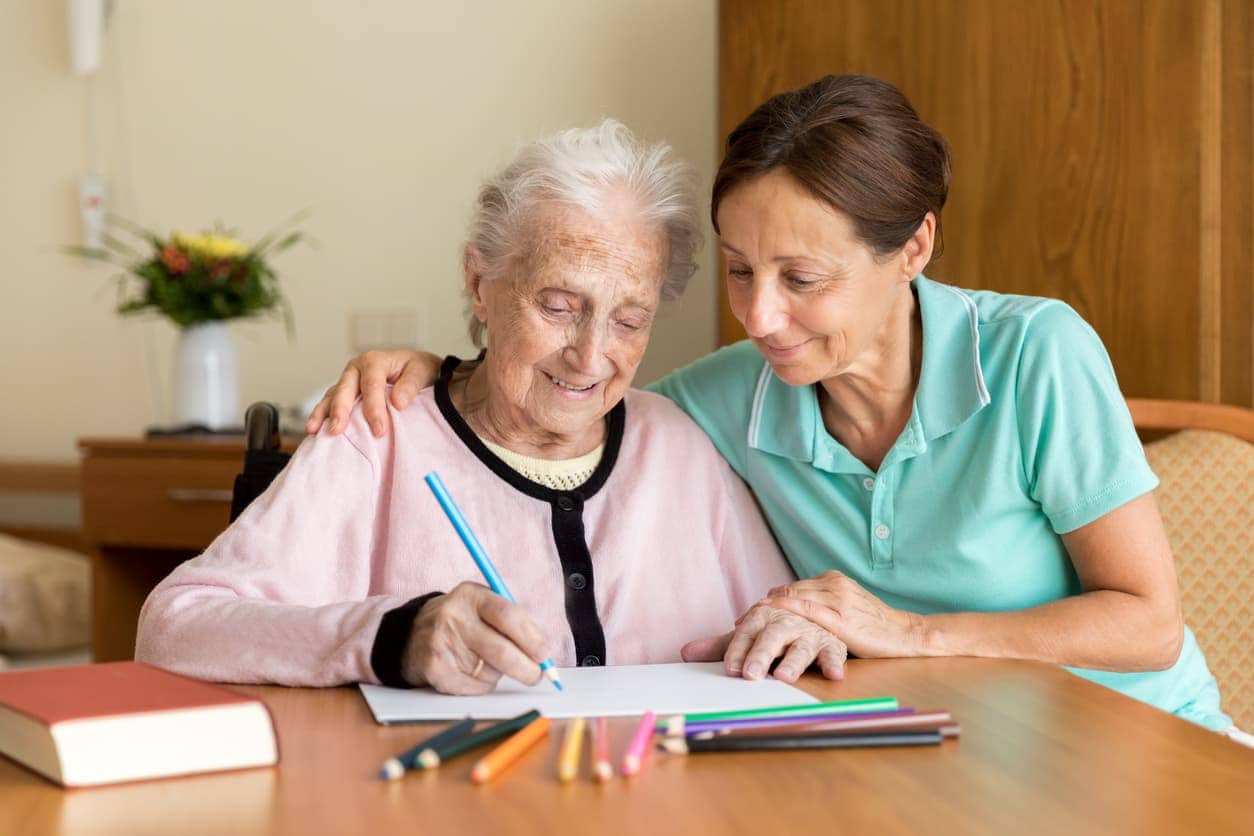
Daily Life with Dementia
While life with dementia is hard for patients, its toll on caregivers can be just as significant, especially for those faced with never-ending care while trying to earn a living, maintain their own health needs and have a life outside of caregiving.
In this video, we hear from Gloria and her aging mother, Geraldine, who has vascular dementia. Gloria is her mother’s primary caregiver. At the time the video was recorded Geraldine was relatively high functioning, but Gloria knows that her mother’s health will continue to decline and her needs will grow as her dementia progresses. At some point, families like Geraldine’s will have difficult decisions to make, including whether to provide continuing care at home or move a loved one to a dementia care location.
How Do You Start the Search for a Memory Care Community?
When it feels inevitable that your current care situation won’t be sustainable for the long-term, hold a family meeting to discuss what might be possible moving forward. It’s important to include all relevant family members who’ll be affected by this decision. For instance, all of Mom’s kids should be invited, whether or not they’re able to attend.
If discussing this sensitive topic will cause more pain and controversy within your family, hiring an unbiased participant, like a pastor, counselor, or social worker can help make the meeting go more smoothly and give everyone a voice.
Another tip: type up a meeting agenda. It doesn’t need to be fancy or complicated, but by adding a few talking points, you can stay on track more easily. Some ideas to discuss pertaining to your loved one:
- Health issues per their doctor’s analysis
- Physical restrictions they’re experiencing, including daily activities they can no longer perform
- Social interaction—are they getting any or enough?
- Caregiving costs
- Emotional and financial concerns
- Questions
It’s always good to have caregiving options, whether or not you’ll need to use them in the future. We’ve put together a list of questions to ask when interviewing memory care communities that are right for your family. Things to consider include:
- Location
- Care levels based on your specific needs
- Types of rooms—shared versus private
- Safety measures, including building security and staff expertise
- Community policies
- Amenities and resident activities
- Overall community culture, ambiance, and compassionate nature of caregivers
Emotional and financial support from the rest of the family plus some outside assistance help Gloria manage her mother’s care. As she states, providing continuous care is all-consuming, and she feels that her life is not her own.
This situation puts Gloria at high risk for caregiver burnout, a serious condition affecting many caregivers. Symptoms of burnout include social withdrawal, depression, irritability, sleeplessness, inability to concentrate, and a host of other health problems.
A report from the family caregiver alliance states that clinically significant symptoms of depression appear in 40-70% of caregivers, with many of them meeting the diagnostic criteria for major depression.
This video titled How to Set Boundaries as a Caregiver might give you some tips healthy tips on managing your caregiving responsibilities. Talking with a therapist is also another step to creating a more balanced life for yourself and your family.
Are you at risk for caregiver burnout? If you notice some of these signs, it might be time to consider more help:
- Changes in your personality, like losing your temper more often or not caring about things that used to be important to you
- Being constantly exhausted
- Getting frequent colds, migraines, skin breakouts or allergic reactions, muscle aches, digestive issues, or other stress-related illnesses
- Lack of appetite or increased unhealthy eating habits
The American Psychological Association recommends a caregiver self-assessment called “How Are You?” developed by the American Medical Association.
Coming to terms with caregiver burnout may be an emotional process for you and your entire family. While very difficult, accepting that change is needed is a healthy way to not only care for your loved one who has dementia, but to also take good care of yourself. Resistance to moving out of a beloved home is a perfectly normal feeling, so as you’re weighing options, here are some thoughts on the benefits of community memory care:
- Your loved one will have someone watching over them 24/7. This is an invaluable gift in keeping your parent or relative safe from harm, including serious falls or accidents.
- A community setting offers social activities to keep your loved one engaged and interested in living to their fullest potential. Conversations, playing music, or piecing together jigsaw puzzles all contribute to treating the effects of dementia.
- As their current caregiver, you get a break from doing all of the heavy lifting. Your health can start to improve as you get back to your daily routine and the things you enjoy.
As hard as it may be to accept, caring for yourself is another way to care for your loved one. Support groups can be a lifeline that can help you feel supported, understood, and connected.
Remember the airlines telling us to always put our oxygen masks on first, then help others? It’s the same with caregiving. Make a point to nurture your own wellbeing before giving everything over to another individual, even a beloved parent. That way, they get the proper care they need, too. Based on this theory, here’s a tip from Harvard Business Review.
Need someone to talk to? We’re here to help.
Avalon Memory Care in Dallas, Houston, and Arlington is home to residents who need professional, loving dementia care. Families can reach us at (972) 713-1383.
Sources:
https://www.caregiver.org/resource/holding-family-meeting/
https://avalonmemorycare.com/questions-to-ask-when-choosing-a-memory-care-community/
https://my.clevelandclinic.org/health/diseases/9225-caregiver-burnout
https://www.youtube.com/watch?v=P2y_D23hkDw
https://www.caregiver.org/resource/caregiving-home-guide-community-resources/
https://hbr.org/tip/2020/07/put-your-own-oxygen-mask-on-first
See More Articles
-
Visiting Your Aging Parent With Memory Loss at Avalon Memory Care
As a loving son or daughter, you naturally want the best of care for your senior parent. The compassionate assisted living caregivers at Avalon Memory Care want you to know that while your parent is living with us, he or she will receive nothing less than respectful, loving care within our comfortable, safe, and fully-staffed
-
Celebrating New Year’s Day in Memory Care
Families often find that celebrations with their loved ones in memory care are easier when they embrace new traditions. For instance, it may not be practical to expect your loved one to stay up until midnight on New Year’s Eve. Instead, consider throwing a New Year’s Day celebration, complete with a countdown to the first
-
Hope For the Future: Emerging Alzheimer’s Research
According to the latest statistics, as many as 5.5 million Americans are living with Alzheimer’s disease, and its prevalence is only expected to rise in the next few decades. At the same time, however, research into treatments for the condition is accelerating. With every passing year, we move a little further down the road toward
Testimonials
Downloadable Resources
We Are Avalon
Discover the heart of our community; download ‘We Are Avalon’ to get to know our dedicated team and our commitment to providing a warm, family-like environment.
Transitional Care Guide
If you’re considering a transition, we’re here to help; download our Transitional Care Guide for compassionate guidance through each step of the process.
Schedule a Tour
Visit one of our 30+ campuses and experience our unique approach to memory care.












